Midwife negligence claims get you compensation when you suffer a lack of care before, during and after giving birth. You can make a compensation claim for medical negligence against the hospital or the midwife responsible for the birth injury.
Birth injury in midwife negligence claims are for damage to you and your baby during birth. They can also be for poor care before birth or a postnatal injury to either of you.
Midwife negligence cases can be distressing for a parent. They may involve the death of the mother and/or the baby and can be catastrophic for the family.
A No Win No Fee medical negligence solicitor will make your midwife negligence compensation claim against those responsible.
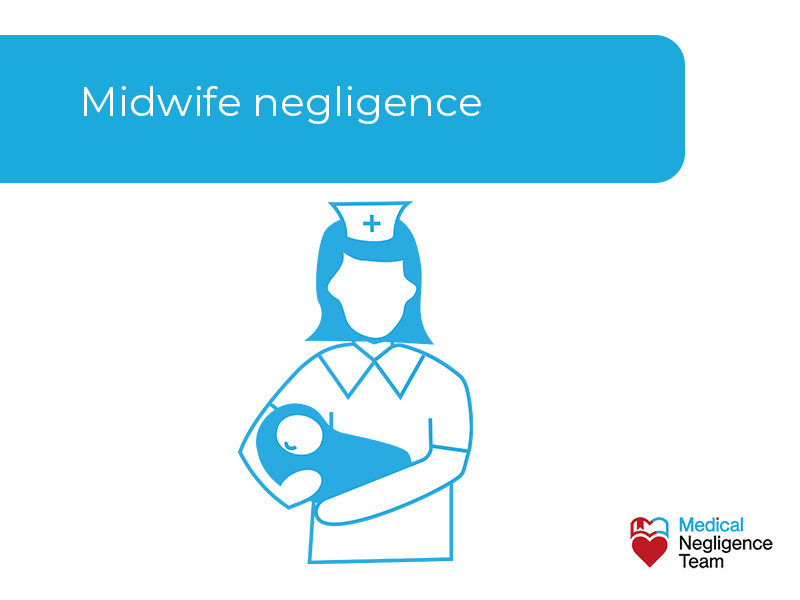
Table of content
What is midwife negligence?
Midwife negligence is a breach of care during pregnancy, delivery and postnatal treatment. If you or your baby are injured at any stage under the care of a midwife, then you have a birth injury claim.
Midwife negligence is care that no other medical professional would provide. It is professional medical care of such low standard that any other midwife would not provide such care.
You suffer from midwife negligence. The injury, infection and any long-term damage to your health from the lack of professional care is not acceptable medical treatment.
When your baby suffers midwife negligence, the effects can be catastrophic and devastating for the family.
You can claim compensation for midwife negligence. Our midwife negligence solicitors will use their experience of the common midwife negligence claims to win your compensation case.
Common claims for midwife negligence
Common claims for midwife negligence cover everything from poor care before the birth, injury during delivery and infection from postnatal care. There are many types of midwife negligence claims, and the common ones are seen all the time.
Common claims for midwife negligence are:
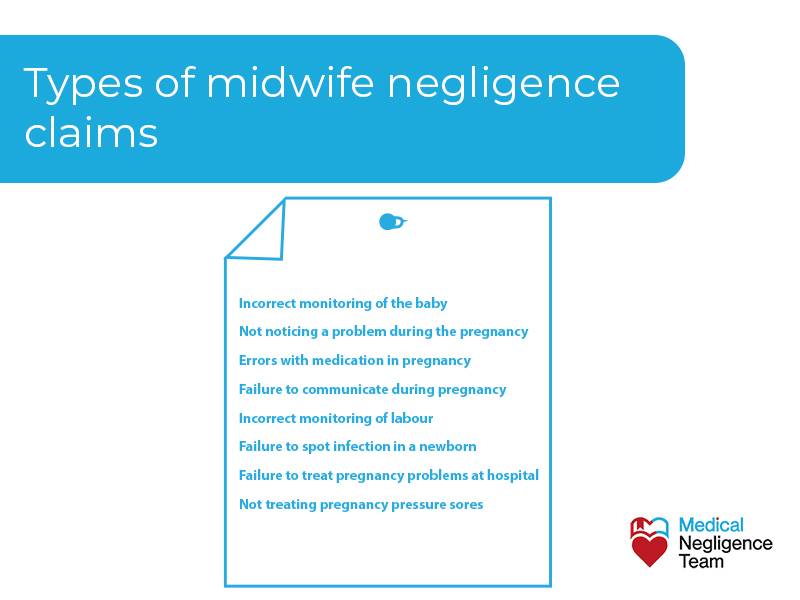
Incorrect monitoring of the baby
Incorrect monitoring of the baby at any stage of the pregnancy can miss the vital signs of danger. The baby’s heart rate may drop, needing intervention or could speed up when the baby is in distress.
Monitoring the baby to keep an eye on heart rate, oxygen levels, and other vital signs keeps the midwife team alert to the baby’s health. Incorrect monitoring by using faulty equipment or even not monitoring at all will put you and your baby at risk.
During pregnancy the unborn baby’s growth may slow to a level that it indicates there is a problem perhaps with the placenta. This is sometimes referred to as intrauterine growth retardation or intrauterine growth restriction (IUGR). This requires urgent monitor and repeat scans so a decision can be made as to whether the baby needs to be delivered early.
Not noticing a problem during the pregnancy
Not noticing a problem during pregnancy is a definite case of midwife negligence. The midwife should do a series of regular check-up tests to keep an eye on potential issues.
If the mother-to-be develops high blood pressure or gestational diabetes, she will need hospital treatment, possibly for an extended period. A trained midwife will test for these and other complications and advise the mother on what to do.
To not notice potential problems can lead to a claim for midwife negligence when the mother or baby suffers an injury. Large babies in gestational diabetes can get stuck resulting in shoulder injury known as shoulder dystocia.
Errors with medication in pregnancy
Errors with medication in pregnancy will endanger both the lives and well-being of the mother and baby. Prescribing an inappropriate medication during pregnancy should never happen, but it does happened and can lead to midwife negligence compensation.
Administering the wrong medication or dose may cause an overdose or not treat a maternity condition. To prescribe a medication that interferes with another one or causes a reaction is midwife negligence.
Failure to communicate during pregnancy
Failure to communicate during pregnancy will lead to poor decision-making, unnecessary distress for a parent and may cause a breakdown in the correct treatment of the mother and baby.
The midwife and team should always inform the parent what is happening with the pregnancy and give them choices where appropriate.
To not keep everyone informed leads to stress on the mother at a time she does not need it.
Incorrect monitoring of labour
Incorrect monitoring of labour, such as not noticing what stage the mother is at or if she is in distress, can lead to birth injury complications.
Regular monitoring of labour to keep an eye on when the mother is ready for birth is essential for a safe and normal delivery.
The incorrect monitoring of labour may see a woman giving birth without appropriate staff on duty or not having the necessary equipment available.
Failure to spot infection in a newborn
Failure to spot infection in a newborn baby can lead to a minor infection becoming a major one. Every child is prone to infection, but treatment should start immediately in a newborn to protect the child from becoming seriously ill.
Symptoms of an infection in your newborn baby can be coughing, a rash, high temperature and a lack of appetite.
Infection in a newborn should be quickly spotted and treated. When it is not treated, it is midwife negligence.
Failure to treat a pregnancy problem at hospital
Failure to treat a pregnancy problem at hospital by turning away a pregnant woman can make a simple issue get progressively worse.
A premature labour or a placental or uterine rupture should be checked for by staff on duty. If they fail to spot a pregnancy problem, it could lead to serious complications for both the mother and baby.
Not treating pregnancy pressure sores
Not treating pregnancy pressure sores will see them get worse and lead to infection like septicaemia, or blood poisoning, which can spread to the womb.
Pregnancy pressure sores start when a woman is immobile during pregnancy. She could be laid up in hospital with placenta problems and other complications.
Midwife staff should look for and treat pregnancy pressure sores; ignoring them is midwife negligence.
All potential problems with a pregnancy are treatable when the midwife does their job at an acceptable standard. Common claims for midwife negligence would not happen if the hospital and staff did a professional job of caring for you.
When there is midwife negligence, there are potential effects for both the baby and the mother.
Potential effects of midwife negligence on the baby
Potential effects of midwife negligence on the baby are injury, lifelong conditions such as post traumatic stress disorder and, unfortunately, death. A perfectly healthy baby comes to harm due to midwife negligence, and the baby may have to live with it for life.
Some potential effects of midwife negligence on the baby:
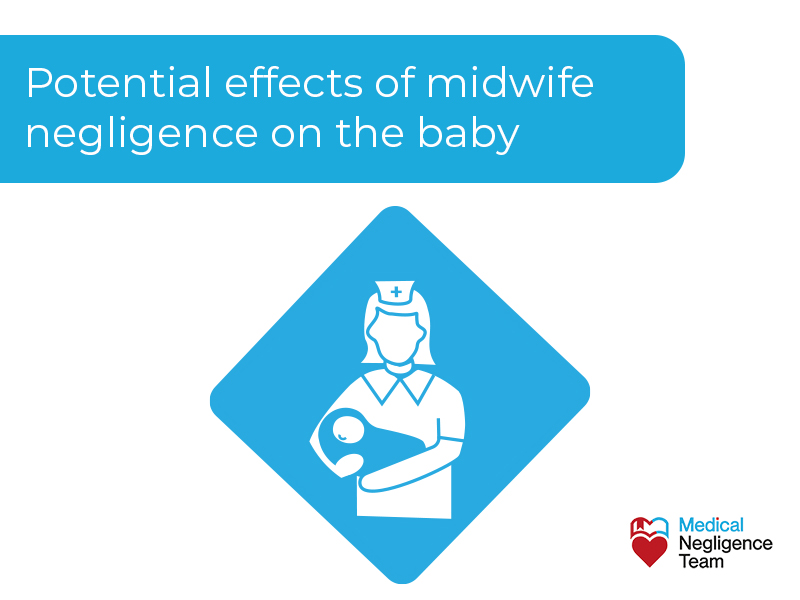
Cerebral palsy
Cerebral palsy is a condition that affects the baby’s ability to move, stand up and keep balance when sitting or standing. It is damage to the brain due to a lack of oxygen during birth.
Cerebral palsy is avoidable, and midwife negligence can be a factor in such cases. The NHS states there are approximately 700 cases of cerebral palsy of which around 65 to 70 result in compensation claims being successful meaning that approximately ten percent of cerebral palsy cases are as a result of negligence. Cerebral palsy cases can run to valuations of above £10 million and are most expensive claims the NHS receives.
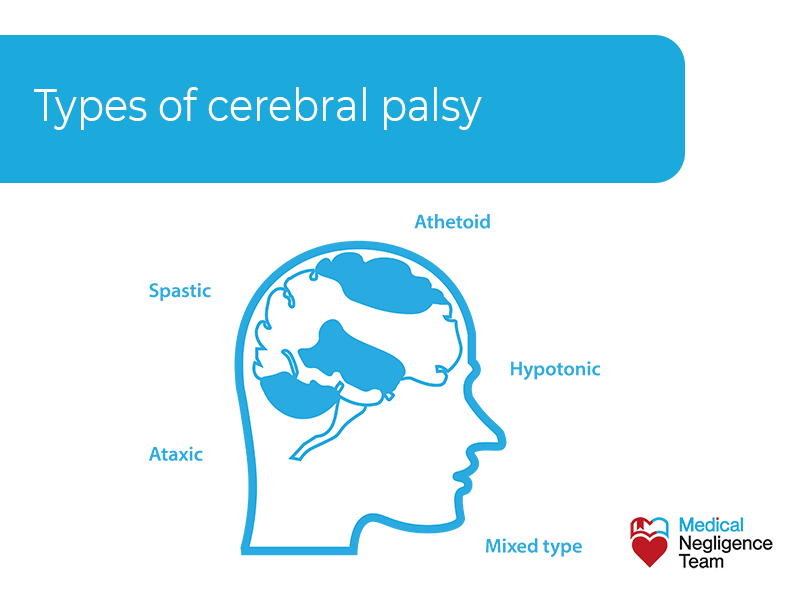
Erb’s palsy
Erb’s palsy is when the baby cannot move an arm or shoulder due to muscle weakness. It results from a birth injury to the nerves in the shoulder and may clear over time after extensive therapy.
Birth injuries giving rise to Erb’s Palsy may arise from midwife negligence.
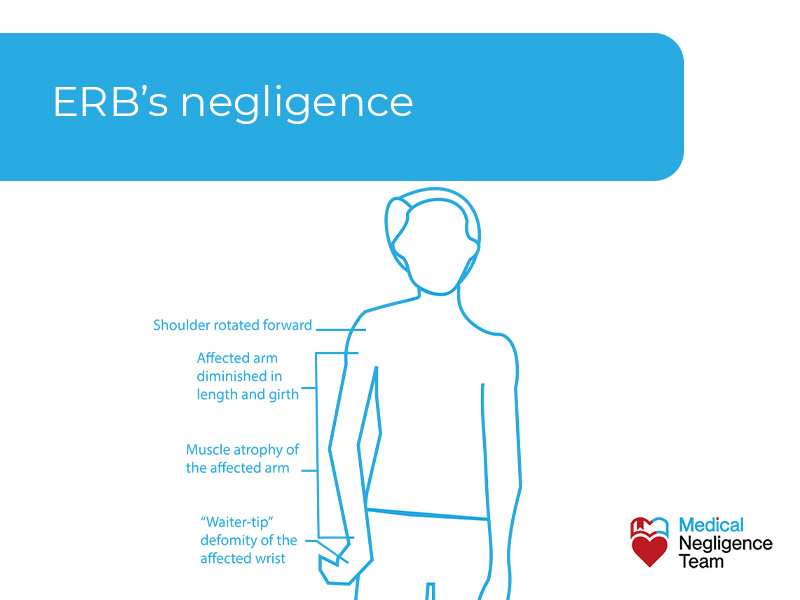
Brain injury to the baby
Brain injury to the baby during birth will have catastrophic effects on the baby. The baby may be disabled for life and be severely restricted in what they can do.
A long birth, one that is not handled correctly, and even the use of forceps can cause brain injury to a baby.
The midwife must deliver care of a reasonable standard to seek to deliver your baby safely and without injury. Not all injuries are avoidable but the NHS over the years has paid out billions of pounds for midwife negligence cases.
Stillborn or death of a baby
Stillborn or death of a baby can happen due to a lack of care by the midwife during labour. The death of a baby can be caused by delays in delivering it, incorrect monitoring and restricting oxygen to the brain.
A stillborn or death of a baby is shocking for a parent, especially when midwife negligence is involved.
Broken bones and muscle damage
Broken bones and muscle damage in midwife negligence happen when the child is not delivered correctly. A broken shoulder or arm is not unusual, and tears to muscles in the shoulder and legs can affect the child for life.
The midwife must deliver a baby with care and attention and not do harm through midwife negligence.
The potential effects of midwife negligence on the baby put you in line for midwife negligence compensation, as do similar effects on the mother.
Our Process
Our team members have a higher career win rate with a 75% success rate on NHS letters of claim, compared to an industry average of 54.5%.
Enquiry
The first step is to get in touch and tell us what went wrong. It’s free and easy. Call our 24-hour helpline: 0800 246 1122 or request a callback here.
Medical Evaluation
Once you have spoken with our team we’ll let you know how we can help. Typically the next step is to obtain your medical records for us to review.
Legal Letter
Once all your medical records have been received they will be reviewed by a medically & legally qualified member of our team. If there is evidence of negligence we will send a letter of claim to the negligent party outlining your compensation claim.
Potential effects of midwife negligence on the mother
Potential effects of midwife negligence on the mother include avoidable injuries, excessive bleeding and psychological problems.
Potential effects of midwife negligence on the mother are:
Perineal lacerations and 3rd or 4th-degree tears
Perineal lacerations and 3rd or 4th-degree tears happen during the delivery of your baby. Proper monitoring of the delivery would avoid serious perineal lacerations, but lack of duty of care sees them happening during labour.
A perineal laceration and a 3rd or 4th-degree tear can affect you for life and cause unnecessary suffering.
Tears sometimes are unavoidable but many claims arise from a tear not being classified correctly so a tear is considered minor and sutured on the labour ward when it is actually a much more serious tear such as a 4th degree tear which needs to be dealt with under general anaesthetic in an operating theatre.
Post-partum haemorrhage
Post-partum haemorrhage is a severe loss of blood after birth and happens due to midwife negligence. You should always be monitored, a coagulant given, and care taken to avoid blood loss, which can endanger life.
You can claim midwife negligence compensation if post-partum haemorrhage happens to you as a result of negligent care.
Uterine rupture
Uterine rupture is when the uterus tears during pregnancy and can be life-threatening. A uterine rupture is usually seen after a previous Caesarean delivery, and the midwife team must take care to avoid this happening.
A uterine rupture is rare but can happen due to midwife negligence.
Incontinence after giving birth
Incontinence after giving birth can be very debilitating and embarrassing for a new mother. Lack of care in delivering the baby and in postnatal care can cause incontinence after giving birth, which may last for years.
If midwife negligence is a factor in incontinence after giving birth; you can claim compensation for it.
Infection after giving birth
Infection after giving birth includes urinary tract infections, wound infections, and soft tissue infections, which can cause serious illness. If spotted in time, most infections after giving birth are treatable by antibiotics, but midwife negligence can let them grow.
Infection after giving birth is avoidable, but midwife negligence or consultant negligence will cause one to worsen.
Stroke in pregnancy
Stroke in pregnancy is avoidable but happens when there is a lack of duty of care for the expectant mother. Regular testing such as blood pressure and other indicators should tell the team if you need special care in case of stroke.
A stroke in pregnancy is avoidable, but midwife negligence can lead to one happening to you.

Emotional trauma in pregnancy
Emotional trauma in pregnancy, before and after birth can be tough on a woman. The trauma of losing a baby during pregnancy or after birth is devastating for the expectant mother.
Emotional and hormonal changes can cause postnatal depression even after a healthy delivery. It is midwife negligence when they ignore the warning signs of your possible emotional trauma.
In all types of midwife negligence, you can claim compensation against those responsible.
Who is responsible for midwife negligence?
The midwife in charge of the delivery of your baby is responsible for midwife negligence. The hospital that employs the midwife may also be responsible if they do not have the systems in place for a safe birth.
Every midwife is fully trained to deliver a baby safely. There is no excuse for errors by the midwife, yet they happen. When you suffer midwife negligence, you can claim compensation.
A No Win No Fee medical negligence solicitor will make your compensation claim for midwife negligence against those responsible.
How much can I claim in midwife negligence compensation?
You can claim from the low £10,000s for minor cases of midwife negligence to over £1 million in serious midwife negligence compensation claims.
Some typical midwife negligence compensation claims:
There is not one compensation amount for surgical negligence. Every award differs, but your No Win No Fee medical negligence solicitor will give you an idea of what is won in similar cases.
All amounts are approximate and are only a guide to what is possible in midwife negligence claims.
As in all medical negligence claims, each case is dealt with on merit and how much you suffer due to the midwife negligence.
A No Win No Fee medical negligence solicitor will be the only one to advise you on a midwife negligence claim. They will know from experience what your case may be worth and how to make a successful claim.
Your No Win No Fee medical negligence solicitor will handle your midwife negligence claim and get you compensation for all damages incurred.
What can you claim for when you sue for midwife negligence?
You can claim compensation for any damages that occurred when you sue for midwife negligence.
There are two types of compensation damages due when suing for any type of medical negligence: General damages and Special damages.
General damages
General damages are when you sue for the pain, suffering and loss of amenity, PSLA, you have experienced due to negligence.
Special damages
Special damages include loss of earnings, future care costs, and out-of-pocket expenses.
Be sure to keep payslips, receipts and proof of any losses you experience due to medical negligence.
You deserve compensation to cover all losses, including loss of life, medical costs, and long-term care needs.
When you or a loved one suffers from the effects of a bowel injury, you claim compensation for midwife negligence.
Your No Win No Fee solicitor will guide you through the steps in making a midwife negligence claim.
What are the steps involved in making a midwife negligence claim?
The steps involved in making a midwife negligence claim go from seeking medical advice to issuing court proceedings.
The steps are a part of any successful compensation case, and settlement can happen at any stage in the process.
Your medical negligence solicitor will do the rest when you follow the steps correctly and gather all the facts and figures.
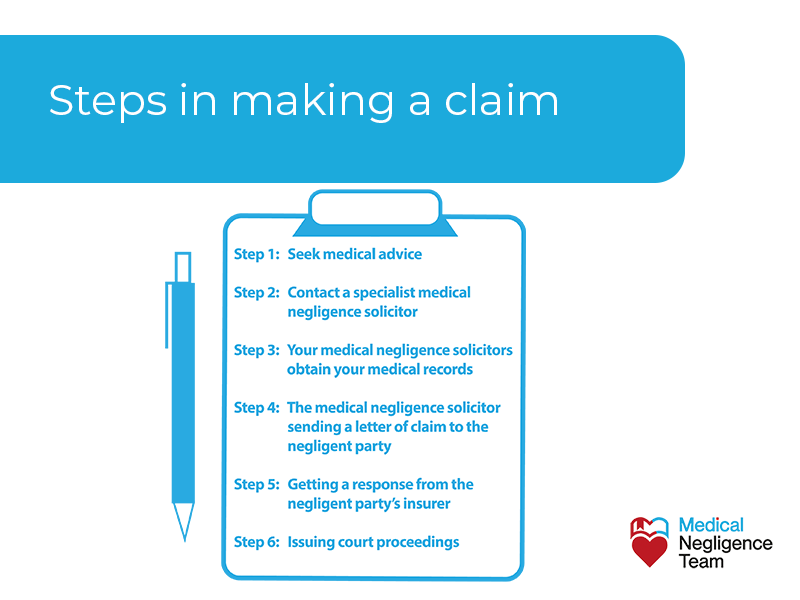
Using a No Win No Fee solicitor
Using a No Win No Fee solicitor is the only way to a successful midwife negligence compensation claim. Your No Win No Fee medical negligence solicitor will not charge you for a claim you do not win.
Always have a fee agreement in place before engaging a medical negligence solicitor. If they start talking of a ‘win fee’ or a ‘success fee,’ you should walk away. The negligent party insurers should pay all fees.
The medical negligence solicitor should also operate a 100% Compensation Guarantee scheme. When you win the case, all the money awarded should go to you, not the solicitor.
You are the one who suffered the midwife negligence, and you deserve compensation to get your life back to normal.
How long do I have to make a claim for midwife negligence?
You have three years to make a claim for midwife negligence. All medical negligence claims are subject to limitation periods.
For example, in England and Wales, medical negligence claims must generally be brought and court proceedings issued within three years of the injury or three years of knowledge of the facts giving rise to the midwife negligence claim.
If someone has passed away, it is the date of death if the limitation period has not expired at the date of death.
Children not under a disability typically have until they reach 21 to start a midwife negligence claim or court proceedings.
Persons with a disability, who lack capacity, are not subject to any limitation period.
Can I make a medical negligence claim against the NHS?
Yes, you can make a medical negligence claim against the NHS. Suing the NHS for negligence is not unusual. People sue the NHS for compensation for medical negligence and receive the money they deserve for the negligent treatment.
There are between 8,000 and 10,000 successful medical negligence claims against the NHS each year—amounts in compensation claims awarded against the NHS range from £1000 to over £10 million.
The amount of compensation you receive covers minor injuries such as scarring to serious life-threatening negligence, which leaves you with long-term care needs.
We trust in and use the NHS daily and do not expect negligence. It happens, though, and the NHS has a dedicated team to handle medical negligence compensation claims, called NHS resolution.
NHS Resolution has a responsibility to treat patients who seek compensation fairly. Patients pay for the NHS through their taxes, and for that they deserve respect and the best medical treatment.
Contact The Medical Negligence Team
Contact the Medical Negligence Team today to discuss your midwife negligence claim for compensation. We have both the legal and medical experts to guide you along the steps to a successful medical negligence claim for compensation.
At the Medical Negligence Team, we fight every compensation claim on a No Win No Fee basis. You will not be out of pocket for an unsuccessful claim.
We have a very high success rate and a reputation for a speedy and successful resolution to all medical negligence cases.
Our 100% Compensation Guarantee puts all the money you win into your pocket. You or your loved one suffered midwife negligence and deserve every penny of the compensation claim.
Contact us at the Medical Negligence Team to begin your claim process today.


